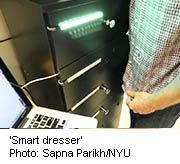Prototype can provide automated dressing support by identifying incorrect dressing scenarios
WEDNESDAY, May 2, 2018 (HealthDay News) — For persons with dementia, a prototype intelligent system, the DRESS prototype, can provide automated dressing support by identifying incorrect dressing scenarios, according to a study published in the April-June issue of JMIR Medical Informatics.
Winslow Burleson, Ph.D., from the College of Nursing at New York University in New York City, and colleagues developed and assessed the DRESS prototype’s capacity to detect dressing events. Eleven healthy participants simulated common correct and incorrect dressing scenarios, ranging from donning a shirt and pants inside out or backwards to partial dressing.
The researchers found that in the initial phases of donning either shirt or pants, the prototype missed four out of 388 expected detections. The ability to recognize other missing detections varied across conditions. Some unexpected detections were observed, including detection of the inside of a shirt as it was being put on. There was an adverse correlation between detection of dressing events with the relatively smaller effective size of markers at greater distances. For shirts, the DRESS prototype incorrectly identified 10 of 22 cases, while for pants, only five of 22 cases were incorrectly identified. Increasing the size of markers, minimizing garment folding or occlusions, and optimal positioning of participants with respect to the DRESS prototype were identified as opportunities to improve DRESS reliability.
“The DRESS prototype has the potential to provide a viable option to provide automated dressing support to assist persons with dementia in maintaining their independence and privacy, while potentially providing their caregivers with the much-needed respite,” the authors write.
Copyright © 2018 HealthDay. All rights reserved.








